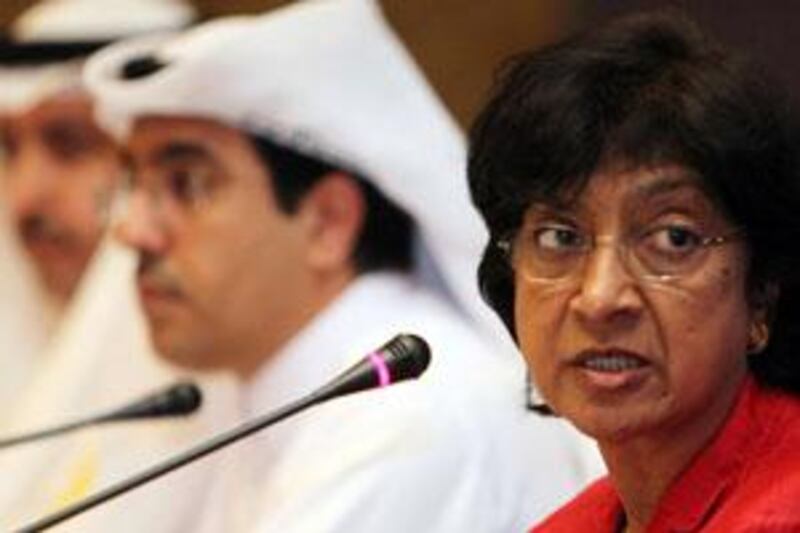DOHA // Continuing an unprecedented 10-day tour of the region, the United Nations' High Commissioner for Human Rights yesterday called for the Gulf's human rights bodies to gain accreditation from the UN's International Coordinating Committee. "They can then benefit from the opportunities to gain and maintain credibility at the national, regional and international level," said Navi Pillay, speaking in Doha at the inaugural Gulf forum for national human rights institutions.
Ms Pillay stressed the need for the enforcement of contemporary human rights standards throughout the Gulf. "Compliance with the Paris Principles is not only a worthwhile goal, but an achievable goal," she said, referring to the main UN-approved rights instrument, in Doha. This week marks the first time the UN's top rights monitor has visited Saudi Arabia, Oman, Kuwait and the UAE. Ms Pillay is scheduled to meet with the governments of all GCC countries and assess the effectiveness of their national human rights institutions.
"The establishment of such institutions should not be taken as an end in itself," she said during her keynote speech at the forum. Ali al Marri, the Qatar National Human Rights Committee chairman, acknowledged that Gulf countries had yet to achieve international standards. "Human rights in the GCC have come a long way," he said. "But there is no doubt that there are challenges that need to be addressed."
Human rights have been institutionalised in the Gulf only in the past decade. In 2002, Qatar established the region's first human rights body. Nearly all its neighbours have since followed suit and each country's rights record has recently been or will soon be reviewed by the UN's Human Rights Council. In Jeddah on Monday, Ms Pillay criticised some Gulf countries' treatment of migrant workers and said Saudi Arabia's male guardianship system, which forbids women from travelling alone, should be "put to rest". Indeed, the Arab Charter on Human Rights, to which all members of the League of Arab States agreed to in 1994, guarantees the right to liberty of movement.
The US State Department and Human Rights Watch have recently cited Gulf countries for rights abuses including prolonged and unjust detention, restrictions on civil liberties and trafficking of labourers. Earlier this week, Mr al Marri said such "wrong reports" from the West were short of information and inaccurate. Yesterday, Mr al Marri called improved human rights a "civilising sign". "These are some of the most important characteristics to reflect the advancement of countries and gain the approval of the international community," he said.
Gulf countries are working to gain that approval. Bahrain has eliminated the sponsorship system for immigrant workers, while several other countries are drafting laws to improve it. Saudi Arabia is building a more progressive judicial system. Last month, the UAE set up a division to fight human trafficking. And during the Doha forum, Hamad al Marri, the representative of the general secretary of the GCC Council, called for the creation of a network to supervise and co-ordinate the efforts of Gulf countries' national human rights institutions.
Ms Pillay visited the Gulf last May to open a new human rights office in Doha. The UN Human Rights Training and Documentation Centre for Southwest Asia and the Arab Region aims to promote human rights and strengthen regional human rights bodies through training and partnerships with civil society and government. Nearly a year after it opened, the centre has yet to launch any major initiatives and its top position remains unfilled. "By establishing this centre, my office has underlined its commitment to co-operate and engage with the countries of the region," Ms Pillay said yesterday.
@Email:dlepeska@thenational.ae






